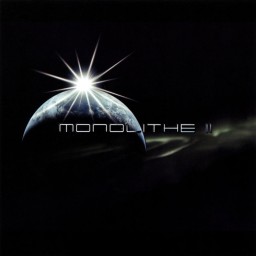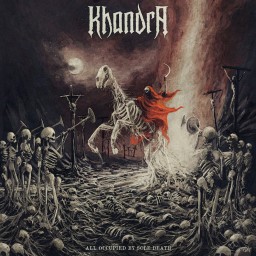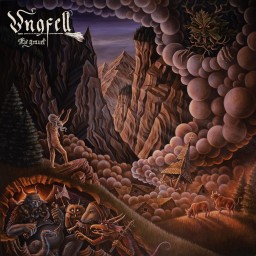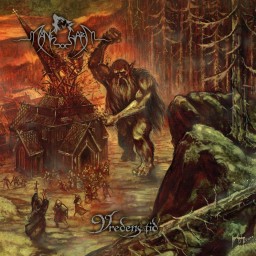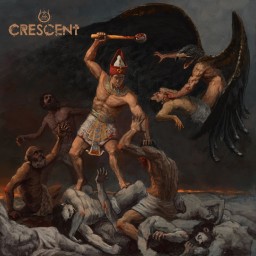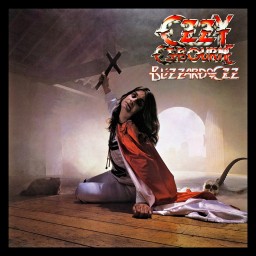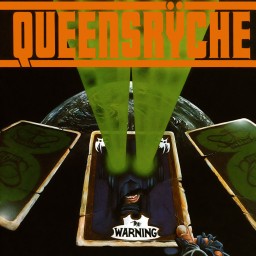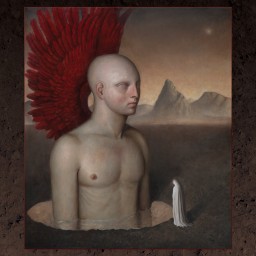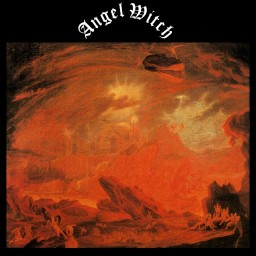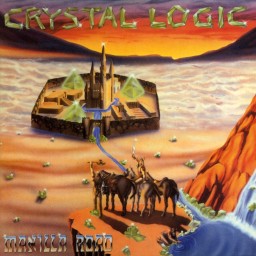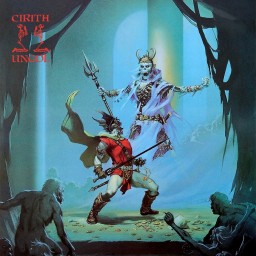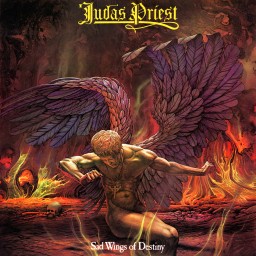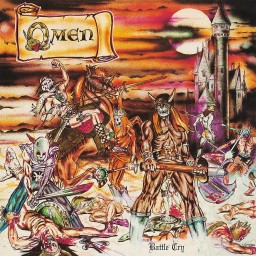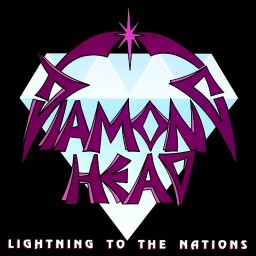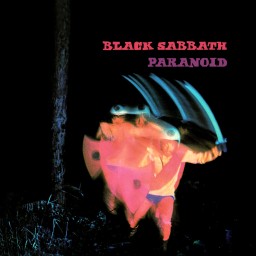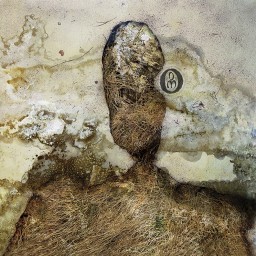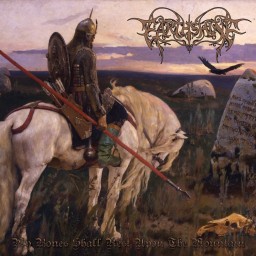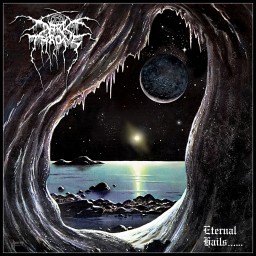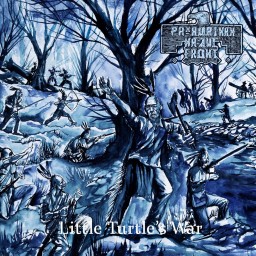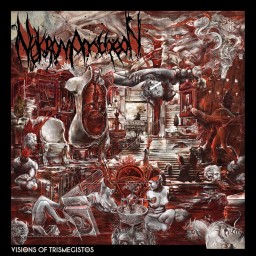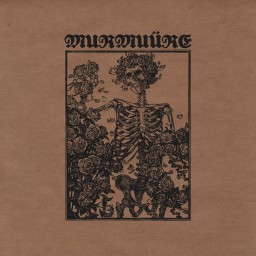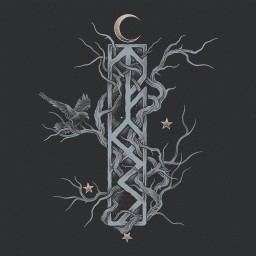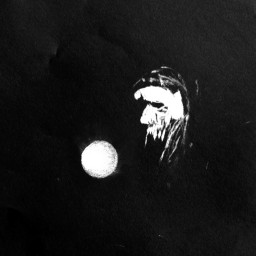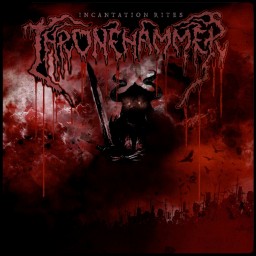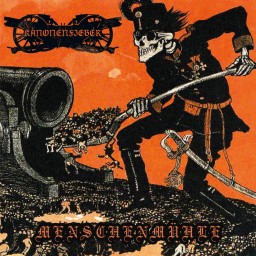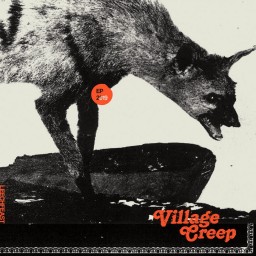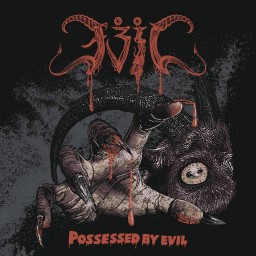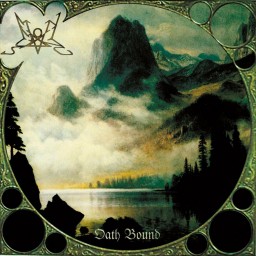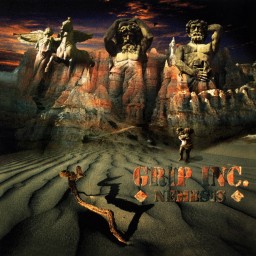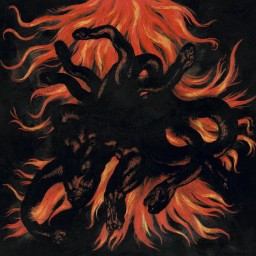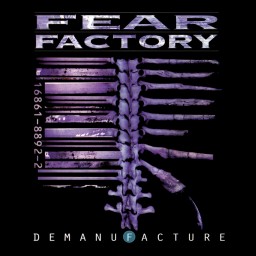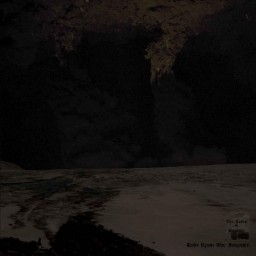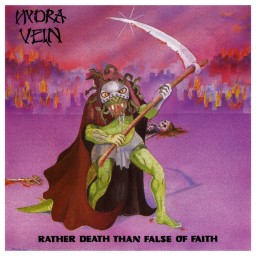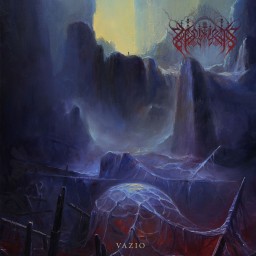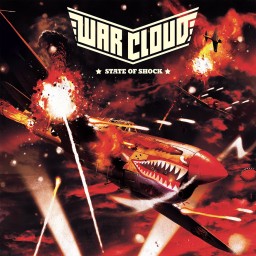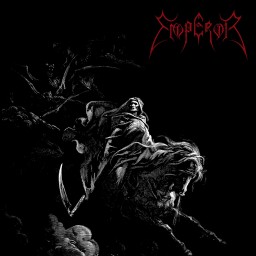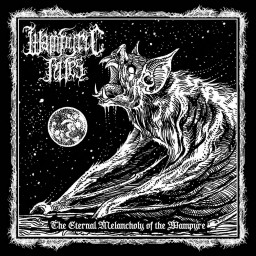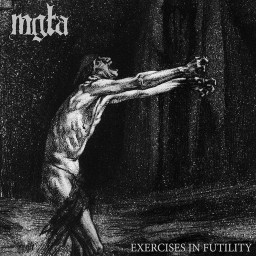Sonny's Reviews
Monolithe's sound has progressed over the years from their early 2000's monolithic (pun intended) funeral doom, through a more death doom-orientated middle period to their current progressive doom phase. As time has passed it has found the Frenchmen becoming more adventurous and slowly developing their sound which has inadvertently (or maybe not) made them relatively more accessible.
Anyway to this month's feature which is most definitely in the "early funeral doom" phase of the band's evolutionary journey. Monolithe II takes the form of a single fifty-minute track, in common with each of the band's first four albums and, the funeral doom newcomer be warned, it relies heavily upon repetition, particular of the opening theme, for the layering and build-up of it's pervading atmosphere. If you are an impatient type of metal head then you are probably best leaving it at that and going back to something more likely to get your blood pumping because this is not an adrenaline rush of an album. Rather, this is a carefully constructed release that cradles and envelops the listener in a sonic womb of slow, thick riffs run through with veins of atmospheric instrumentation that utilises keyboards, gorgeous guitar refrains and even, in a nod to their homeland's folk music, an accordion (provided by guest Manuel Mechling) which, surprisingly, sounds fantastic and fits in perfectly with the vibe the band are attempting to convey. Meanwhile, whilst the music cocoons the unwary listener, vocalist Richard Loudin croons into the ear with his deathly growl like some Babylonian god of dreams, one moment comforting, the next discomfitting. This really is the kind of album that you have to let wash over you and consume you, allowing it to enter into both your conscious and subconscious mind and the most rewarding listens are when you are able to give yourself up to it completely, let go and see where it takes you. For me this is genuinely relaxing and soul-cleansing music, in the same way as with certain ambient pieces, this is the kind of album who's atmosphere takes you out of the everyday and transports you to a less mundane place, opening up the imagination as it does so.
However, it must be said that there is very little variation in pacing throughout the entire runtime, nor is this the glacial crawl of real extreme funeral doom, sitting comfortably in a medium-paced range. Neither does it convey a cloying atmosphere of melancholy that is typical of the genre, often feeling quite uplifting, so again this may annoy some funeral doom purists for not being sufficiently funereal. Yet it does posses a few moments where the tone changes and becomes more discordant and when this does happen it can sound quite menacing. Overall I would say this is a beautifully put together album of extreme doom metal that rewards the listener the more they are prepared to invest into it. An immediate release this isn't and I can understand why some wouldn't care fot it, but as far as I am concerned this is doom metal heaven.
Genres: Doom Metal
Format: Album
Year: 2005
Khandra are a Belarussian black metal four-piece who are now releasing their debut full-length on Season of Mist after a couple of well-received eps and, I've got to say, it's a decent slab of orthodox black metal mayhem. There's some variety to the pacing with some decent riffs and some slower sections but where it impresses most is when the blastbeats kick in and all unholy fucking hell breaks loose. In fact, not just with the blastbeats but in general, Pavel V's drumming is a powerful weapon and propels the tracks along effectively. Another impressive contribution is Vladimir Borodulin's vocals which have a vicious power to them that isn't always present in black metal vocalists (he was singer with brutal death metal outfit Relics of Humanity for four years, so it's not so surprising). The guitars have a searing edge to them that teases and torments the nerve ends although, in what is my only real gripe, they sometimes end up becoming buried in the mix when things get hectic.
This isn't really an album that is riff-focussed, it feels more atmospheric than that, but when the riffs are presented they are sufficiently effective and fairly memorable, as in my personal favourite In Harvest Against the Sun. There's an energy to All Occupied by Sole Death that makes it hurtle along and a savage atmosphere pervades the whole album that hints at a dark heart at it's centre.
There are a good number of black metal bands of varying quality coming out of Belarus currently and Khandra should really be right up in the vanguard with their aggression, savagery and atmosphere leaving a large number of their compatriots wanting.
Genres: Black Metal
Format: Album
Year: 2021
Ungfell is a Swiss black metal project comprising multi-instrumentalist Menetekel and drummer Vâlant with occasional guest performers providing additional vocals or strings. Es Grauet is their third full-length and my favourite to date. It's melodic black metal is quite complex as Menetekel piles on the riffs then let's them go and intercedes with some excellent folk-laden passages, such as D Schwarzamslä (Wie us däne Goofe Pfaffä wärdet), that really add some, often quite gorgeous, atmosphere to proceedings. Don't fear, however, if the folkier parts aren't your bag brecause another frantic riff-fest is never too far away.
The album has an overarching narrative about a grisly murder in some old-time rural village (I'm thinking of the type of German village depicted in many 1960's Hammer horror movies) and it's corrosive effect on the inhabitants. Like most native English-speaking black metal fans I guess, I don't understand the lyrics so the concept is largely lost on me, but even so the structure of the album is still obviously conceptual. The band do a great job of selling the concept and are extremely succesful at conjuring up images of a rural backwater that is living under a dark cloud. Atmospherically I think the darkness is almost tangible, even though, weirdly, this is more explicitly felt during the folk-driven passages than during the metal ones. The riffs may possibly be a little too melodic to adequately convey the necessary level of disquiet, but let's be clear, they are great from a purely metal point of view. If you just want to hear some solid black metal riffing then when Ungfell let rip they certainly hit the spot.
I can see (or more accurately, hear) that there are those who may well take against this. It's constant transitions from riffing to gentler folkiness may cause some to baulk. Others may feel that the riffs themselves aren't evil enough and err too much on the melodic side. Me, I could care less, I still think this is a really enjoyable release and one I will definitely return to. I've also got to say, I love that crazy cover. I'm not sure how it relates to the album's tale but it is certainly fun and interesting.
Genres: Black Metal
Format: Album
Year: 2021
WWI-obsessed Finnish duo Somme follow up last year's eponymous EP with another that very much ploughs the same furrow as it's predecessor. Raw and harsh-sounding black metal designed to flay the skin from unguarded body parts is the staple of this release as it was the former (obvious really as they are on UK label Death Kvlt). That said, my favourite track The August Sun is surprisingly melodic despite retaining that raw edge. Prussian Blood feels more accomplished than Somme and definitely marks an upward trajectory for the duo. I'm not sure how a full-length would be received at this point, their rabid and savage black metal may be better served in smaller chunks so, consequently, the EP format suits them perfectly.
Genres: Black Metal
Format: EP
Year: 2021
I've got to admit to not being the biggest fan of folk metal, outside of the odd Finntroll or Moonsorrow album. I feel it's too often the black metal world's answer to European power metal and has, correspondingly a far too excessive cheese factor for my personal taste. In a perfect world any pre-existing personal bias shouldn't make any difference and each release would be judged objectively but, sadly, I am not that person and it explains my initial reticence as far as Vredens Tid goes, the upshot of which is that I wasn't especially engaged with it over the span of an initial listen. However, my disposition to Månegarm's fourth full-length improved over the course of subsequent listens and by the third or fourth spins I was genuinely beginning to enjoy aspects of it.
I think the primary reason for that is that the actual black metal side of Månegarm's folk metal equation, despite sitting quite firmly on the melodic side of the scale, is really well done and is pretty visceral. I don't think that the black metal savagery hits hard enough first time around, especially for someone like myself who doesn't listen to a whole lot of folk metal, but following subsequent listens when the folky trappings can be mentally stripped away it is apparent that a true black metal heart beats under the surface. This is most obvious in Erik Grawsiö's vocals as he delivers them with real blood-red aggression.
That said, there were aspects of the folkier side of things that I still struggled with. The album started quite strongly and the first two tracks proper after the intro are probably my favourites (although the eight-minute Hemfärd does come close). The violin work on opener Sigrblot in particular grabbed my attention and is the best iteration of the folk metal vibe on the record. On the downside the female vocals provided by Umer Mossige-Norheim didn't really do it for me and I found them a little bland to be honest, in fact they completely ruined the title track which is, in all other respects, a belter. The tendency for most of the tracks to end up sounding like a jig I also found grating after a while. Another annoying tendency in the small number of folk metal albums I've listened to is the "sound affects" tracks (Moonsorrow can be a little annoying in this respect), Preludium in Vredens Tid's case, which just adds nothing in my opinion and merely pads out the run time.
So a bit of a mixed bag for me, aspects both ridiculous and sublime feature during the album's eleven tracks. On the positive side, as far as folk metal is concerned it is one of the better albums I have heard and although I'm not likely to return to it much, tracks like Sigrblot, Vredens tid and Hemfärd may get an independent spin on Spotify as the mood strikes.
Genres: Folk Metal Viking Metal
Format: Album
Year: 2005
I enjoy the sound and melody of Middle Eastern music but when heard in the context of metal it takes on a whole different level of intrigue, sounding darker and more exotic, at least to this jaded westerner's ears anyway. Crescent are an Egyptian band who take the history and folklore of their much historied homeland and present it through a blackened death metal prism. The result is a fairly brutal-sounding assault that still manages to summon up a nice level of melody and, with it's assimilation of elements of egyptian folk music, brings a nice contrast to the more usual and numerous instances of european folk-influenced black metal. Yes, they are kind of treading a similar path to Nile, but are much rawer than the US tech-death merchants and other than thematically they actually have little in common.
Personally I think Crescent deserve a bit more exposure and are certainly no gimmick, their Middle Eastern-flavoured metal is the real deal and anyone looking for a well-written and produced album of blackened death with a different slant should at least give Carving the Fires of Akhet a listen.
Genres: Black Metal Death Metal
Format: Album
Year: 2021
And so it came to pass that, after their Tenth Anniversary World Tour, Black Sabbath and their charismatic frontman John "Ozzy" Osbourne parted ways. Although it was a huge disappointment at the time, in hindsight it was the only real way forward for all parties involved. I had seen Sabbath on that tour and if I was being brutally honest I would have to say that Ozzy was fucked-up big time. He was obviously shit-faced on stage and at times not far from incoherent. To make matters worse the band were supported by an up-and-coming US outfit called Van Halen who had an energy and vitality that the Sabs sadly seemed to have lost. So in a way, it was obvious even then that time was running out for the original lineup.
Anyway, 1980 saw the release of albums from both the revamped Sabbath, who had recruited diminutive ex-Rainbow singer Ronnie James Dio, and Ozzy's new band who were going by the name Blizzard of Ozz. Sabbath dropped their new album, Heaven and Hell, in April to much acclaim from fans and critics alike so the pressure was on for the Oz to produce. Ozzy had also procured the help of an ex-Rainbow alumni in bassist Bob Daisley and veteran Uriah Heep drummer Lee Kerslake completed the solid rhythm section of Ozzy's new crew. However it was in the recruiting of electrifying and hugely talented guitarist Randy Rhoads from Quiet Riot that Ozzy revealed his masterstroke. Rhoads was a classically trained guitarist who's technical ability allowed him to push the limits of what metal guitarists were doing at that time - he is often cited as one of the leading influences of neoclassical metal guitar playing - and his energy seemed to have revitalised Ozzy and given him back his edge.
September of 1980 saw the release of the Blizzard of Ozz album and a new dawn called for the former Sabbath singer. The album featured eight tracks and a short instrumental, ran for almost forty minutes, had a nice variety of pacing and some killer hooks. I Don't Know is a solid opener and is a bit more uptempo than we are used to hearing from the Ozz. Randy Rhoads' more flamboyant style contrasts really well with the solidity of the rhythm section and pushes Ozzy himself to a new level. With the now overfamiliar yell of "All aboard" the band launch into the riff that launched a thousand sporting events and a song that may be even more famous than Paranoid - Crazy Train. It's an energetic celebration of a track that is very difficult to listen to objectively any more due to overexposure, but at first it sounded awesome. Next up is the balladic Goodbye to Romance which really should be a bit too cheesy and overly sentimental for my usual taste but, mainly because of Ozzy's charismatic vocals, I really like it. Dee is a short instrumental piece where RR gets to show off some of his classical training and leads us into one of my album highlights, Suicide Solution, a real belter of an early eighties' metal track and the closer of side one.
The second side begins with Mr. Crowley which both tonally and thematically is the most Sabbath-like track on the album. This is followed by most people's least favourite, No Bone Movies, which is no classic, but doesn't, in my opinion, stick out like a sore thumb as being especially terrible either. Then we come to my favourite part of the album. For me, the last two tracks are where it's at with this album. Revelation is a classic Ozzy track and is the most heartfelt song on the album with a brilliant build and a triumphant ending that leads straight into the sledgehammer riff of Steal Away (the Night) which brings proceedings to a close in thunderous style.
The album isn't perfect, some of the lyrics are a bit painful, but there are some brilliant songs on here, Ozzy sounds rejuvenated and Randy Rhoads' riffing and solos are worth the entry fee alone. I don't know if this is a controversial opinion, but I prefer this to Sabbath's Heaven and Hell album (although it's not quite as good as Mob Rules). Personally I feel this was the last great album Ozzy was involved in - Diary of a Madman is good, but inferior to this and anything after that is forgettable at best, utter shite at worst.
Genres: Heavy Metal
Format: Album
Year: 1980
I am a massive fan of Queensrÿche's classic 1988 Operation: Mindcrime album, it is one of my top-rated heavy metal albums, yet inexplicably I have never bothered with any of their other releases. So I am only now getting acquainted with their 1984 debut for the very first time.
The Warning grabbed me from the off with it's strikingly melodic, yet powerfully delivered opening track, following it up with a Maiden-esque gallop through En Force and that opening one-two had me hooked and eager for more. If En Force was heavily derived from Iron Maiden's Steve Harris, bass-fuelled galloping style, then next track Deliverance is just as obviously influenced by Judas Priest's Sad Wings of Destiny. With No Sanctuary Geoff Tate introduces more progressive elements and variations in pacing. It is also at this point that I became aware that the album is presenting a coherent theme, the lyrics all relating to the search for freedom and the attempts by the strong and powerful to deny it, the speedy N M 156 attributing that oppression to the very machines we create to free ourselves from mundane labour.
Take Hold of the Flame seems to be everyone's favourite track (if RYM's track ratings are anything to go by) but personally it's the track I like least, sounding a little too AOR-oriented for my taste and possibly written with radio airplay in mind. Before the Storm is a decent track, but doesn't really grab hold of me like those on side one. Child of Fire once more heavily invokes Judas Priest, at least initially before it heads off in a more restrained and emotional-sounding direction, returning after a nice solo to the Dissident Aggressor-like riff of the earlier section.
And so to closing track, the almost ten-minute Roads to Madness, where Queensrÿche begin to properly explore a more progressive metal direction and in so doing turn in the album's best track. Geoff Tate's vocals on this track are fantastic and sound genuinely filled with emotion. This is the real precursor to where Queensrÿche were heading, I feel and is a great closer for an impressive, if not completely flawless, debut. Despite showing it's influences, Geoff Tate and co stamped more than enough of their own character onto the tracks and displayed enough songwriting chops and technical virtuosity to make The Warning a standout album in the early days of the US power metal movement.
Genres: Heavy Metal
Format: Album
Year: 1984
I really loved last year's collaboration between Spectral Lore and Mare Cognitum. Happily both bands have gone on to issue terrific albums in their own right this year. Spectral Lore, though, have gone for a bit of a change in atmosphere and the expansive, cosmic nature of their work on Wanderers: Astrology of the Nine has given way to a much more aggressive set of tracks that don't skimp on the blasting and pummel away on your eardrums with a palpable viciousness which feels more closely related to Castles Conquered and Reclaimed, the album he also released last year as Mystras. This is still essentially an atmospheric black metal release and despite the blasting, frantic tremolo picking and ragged shrieking of more orthodox black metal it has some nice exotic-sounding melodies underneath that may or may not derive from the folk music of Nihilus' native Greece. The album closer, Terean, is a nineteen minute curveball, being an ambient track that acts as a kind of comedown from the intensity of the previous hour's black metal assault, allowing the listener some time to breathe and re-adjust as he or she transitions back from Nihilus' world of densely layered and dark, atmospheric savagery back into the familiar normality of the real world
At 76 minutes it's a bit of a beast, but I never found myself getting bored and remained engaged with the music and the atmosphere it created for it's entire runtime.
Genres: Black Metal
Format: Album
Year: 2021
Angel Witch were one of the bands, along with Saxon and Girlschool (among others), who were championed by Lemmy and I first became aware of all of them after seeing them live as support acts for Motörhead on tours during '78 and '79. The trio of Heybourne, Riddles and Hogg were my favourites though and had a fantastic energy in a live setting. Their debut also proves that they had the songs too.
The album dropped at the end of 1980 with the NWOBHM in full gear and was the equal of anything the scene had so far delivered, including Iron Maiden's debut or Saxon's Strong Arm of the Law. Heybourne had a tremendous knack for combining killer riffs with anthemic, sing-along choruses to consistently produce some of the most memorable tunes of the early Eighties' UK metal scene. I truly love every track on this record and don't believe there is a weak one among them, but particular praise must go to the epic storytelling of personal favourite White Witch and the monstrous riff of Angel of Death, a riff so good that Manilla Road "borrowed" it for Dreams of Eschaton on Crystal Logic. The title track is as recognisable to any old English metal head as Paranoid, Ace of Spades or The Number of the Beast are.
If there is any bone of contention around the album, then it is probably down to Heybourne's vocals. Kev certainly isn't going to rival Rob Halford or Bruce Dickinson vocally, but I personally think his singing is fine and help define Angel Witch's identity. Lyrically Angel Witch plunder the fantasy occult treasure chest of wizards, witches and mythical beasts for most of their themes, a source which has served metal well over the years and won't give you any life-changing insight, but is damn entertaining as recompense. The rhythm section of Riddles and Hogg provided a solid foundation over which Kevin Heybourne was able to weave his magic of awesome riffs and red-hot solos that were disciplined and focussed, never becoming self-indulgent.
Unfortunately for the band and for us fans trouble was never too far away and inter-band strife meant that the trio had split barely before the record hit the shelves. They seemed to be unable to maintain a stable lineup so by the time the follow-up Screamin' N' Bleedin' came out in 1985 the metal world was in the grip of thrash fever and Angel Witch had lost momentum, becaming an also-ran in the metal world. The 2010's have been a lot kinder and the band have released a couple of decent albums in '12 and '19 so maybe they are now getting a little of the success that this legendary debut should have assured them.
Genres: Heavy Metal
Format: Album
Year: 1980
What little I have heard of Manilla Road, which amounts to their 1986 album The Deluge, never really filled me with much of an urge to check them out further. As a consequence Crystal Logic is the first album of theirs that I have spent any meaningful amount of time with. Early on in it became apparent to me why I have failed to engage with MR and that reason is Mark Shelton's vocals. His nasal delivery I found whiny-sounding and, frankly, unbearable. On the odd occasion when he adds a bit of a gruff edge to his singing it sounds a bit like Bon Scott and is much more acceptable, but generally I found it hugely distracting, hitting absolute rock bottom on the title track - and this is from someone who enjoys Cirith Ungol's Tim Baker's vocals!
Vocal misgivings aside though, musically I quite enjoyed Crystal Logic, Shelton's guitar playing being far superior to his singing. His speedy NWOBHM-inspired proto-power metal riffing and soloing are pretty good and even manage to shine through a less than stellar production job. Judging by the track ratings on RYM most listeners seem to enjoy the first couple of tracks after the intro best, Necropolis and the title track, but I feel that the album's best tracks begin after the execrable Feeling Free Again, a song that would be awful even with decent vocals. The Veils of Negative Existence is probably my favourite track, it has a Pentagram-like main riff and it's slower pace means that it could even be classed as trad doom, which is no bad thing in my book. The closing track, the twelve-minute Dreams of Eschaton / Epilogue starts with a rather limp balladic intro but soon explodes into a great main riff that I especially loved the first time I heard it on Angel Witch's Angel of Death back in 1980, the track proper ending with an extended solo that sounds like the concluding solos to Lynyrd Skynyrd's Freebird or Blackfoot's Highway Song.
To be honest, I really can't see why this is held in such high esteem other than for it's historical value. It is a part of metal history for sure, being a stepping stone in the development of US power metal, but that's not enough for me I'm afraid.
Genres: Heavy Metal
Format: Album
Year: 1983
I was originally attracted to Cirith Ungol's 1984 release by the random coincidence that the cover art was the same Michael Whelan painting as that of a paperback issue of Michael Moorcock's Elric novel The Bane of the Black Sword, a fantasy series of which I was a huge fan at the time (and must admit, still am to this day). Initially, I confess, I wasn't exactly sold on the Californians' brand of epic heavy metal, but as the years have passed they are a band I have become increasingly fond of, whose new releases I greet with some anticipation and whose earlier discography I have positively re-evaluated.
The reason for my original reticence, I'm sure you have guessed, was Tim Baker's high-pitched vocal delivery. In much the same way as King Diamond, Baker's vocals are a bit divisive. His pitch isn't as falsetto as King's as he does mitigate it by having a rough, rasping edge to his voice which is more obvious the lower he sings, but it is still a style that doesn't hold universal appeal. However, I have now become used to his vocal eccentricities and actually I appreciate the fact that they differentiate the band from the pack.
Anyway, Cirith Ungol play epic heavy metal that has it's roots in classic Sabbath and the NWOBHM. For some reason they are often associated with the traditional doom metal scene and while some of their tracks are kind of slow and the guitars are downtuned, I don't think that association really holds up to close scrutiny as this is most definitely first and foremost heavy metal. King of the Dead is the follow-up to 1981's Frost and Fire, itself only being released after the band had been in existence for a decade, and sounds very much like a band who know what they are about and are happy with their own identity. King of the Dead exudes confidence and a "this is us, fuck you if you don't like it" attitude that I wholeheartedly applaud. Although album opener Atom Smasher isn't the greatest introduction to the album, being one of the weaker tracks, there are some absolute killers on here that any fan of 1980's heavy metal should lap up - Master of the Pit, Cirith Ungol, the speedy Death of the Sun and best of the lot the title track, King of the Dead.
The riffs are titanic and the late Jerry Fogle cranks out some great solos. The rhythm section drives the tracks along and feature quite prominently, particularly Flint's bass which takes a lot of influence from the great Geezer Butler. The production is fine, although I certainly wouldn't call it pristine, it does add a certain character to the album. The only real bummer for me was the misguided inclusion of a metal interpretation of J.S. Bach's Toccata in Dm which sounds incredibly self-indulgent. Luckily they don't close the album on that note, but follow it with the mighty Cirith Ungol, an epic closing track that does the whole album preceding it justice.
Whilst not exactly an underground band, I feel Cirith Ungol don't always get the respect they deserve as part of the 1980's metal scene and King of the Dead should be required listening for anyone purporting to be a real fan of heavy metal.
Genres: Heavy Metal
Format: Album
Year: 1984
Judas Priest's Sad Wings of Destiny was the second most important record after Sabbath's Paranoid in my personal journey through the metal universe. After hearing a schoolfriend's copy of Stained Class I went out and bought Sad Wings (we traded taped copies afterwards) and then I absolutely played it to death. My view back then was that a day without Sad Wings was a day without sunshine! Nowadays I prevaricate between those two albums as to which I think is the better, but both are classics and this in particular is chock-full of metal anthems - Victim of Changes, The Ripper, Tyrant and Genocide are all instantly recognised by most metalheads.
Interestingly, the released tracklisting is not what the band originally intended. Somewhere the sides were mixed up for the original release and they have stuck with it ever since, but the album was intended to start with Prelude and end with the Dreamer Deceiver / Deceiver couplet. When listened to in that order, the tracklisting does make more sense and flows better, I think most people would agree.
At this point, SWoD being Priest's second album, the band had not yet been transformed into the metal gods they would later become (that came with the release of 1979's Killing Machine) and they still retained a little of the rock ethic from their debut, although at a reduced level. That isn't meant in any way detrimentally as I think it gave the album a greater variety than an all-out metal assault would have done. That said, the metal is the real draw here, but I think it is at it's best when accentuated by a bit of a build up, such as when Prelude builds it's pomp and circumstance into the release of the killer opening riff of Tyrant or when the balladic Dreamer Deceiver builds during it's own runtime and then bursts out into the riff of Deceiver.The twin guitar attack was fairly unusual at the time and Glenn and KK's fretwork really set Priest apart and was the big revolution in metal music that had enormous influence on future metal heroes from Iron Maiden to Metallica and Slayer. Of course there was also Rob Halford's incredible vocal range which few have ever been able to match and was the other defining element of Priest's sound which set them apart from and above their peers.
Priest were well and truly on the rise at this point, which coincided with Sabbath's descent from the metal mountain peak and were really the only game in town, true heavy metal-wise, Motörhead's debut still being over a year in the future. This metal vacuum certainly did Priest no harm as it enabled them, over the course of this and the succeeding three albums, to pretty much define the heavy metal archetype. I know many, particularly those not around during the Seventies, cite Painkiller or even Defenders of the Faith as Priest's peak and those are indeed fine albums, but for me the run of albums from this to Killing Machine were their pinnacle and Sad Wings is a hell of a way to kick off such a run of releases. Not for nothing does the triplet of tracks from this, Victim of Changes, Genocide and Tyrant climax the 1980 live album - it is because they are absolute killer metal anthems and live they will rip your fucking head off!
Genres: Heavy Metal
Format: Album
Year: 1976
OK, so Omen are another band who have passed me by until now, although in their case it's not so surprising due to their power metal credentials. But this, their debut album released in 1984, is actually pretty damn good. I listened to it blind, in that I didn't know anything about it or the band going in and if you had told me they were from Croyden or Coventry I would have believed it, so pronounced is the NWOBHM influence on the sound of the album. But, guess what, they're not from London, but from Los Angeles, better known at the time for being the ground zero of the glam or hair metal scene and home to outfits like Mötley Crüe, Dokken and Quiet Riot, a scene to which I have a particular aversion.
Omen managed to rise beyond LA's neon and leather decadent superficiality and took the energy of the NWOBHM and in particular Iron Maiden's early releases and super-charged it by infusing it with speed metal's searing attacks and as such, it is to my mind at least, a solid early example of what would later become known as US power metal. The album is chock full of remarkably infectious and memorable riffs, Kenny Powell's solos tend to be short and to the point, eschewing egotistical exhibitionism and J.D. Kimball's vocals aren't at all histrionic like a lot of other PM singers of the time, but have a gruff, cigarettes and whiskey edge, kind of like Joey Belladonna crosed with Bon Scott.The lyrics and aesthetics are based around fantasy literature and movies and whilst they aren't as cheesy as some, they do occasionally cause the odd grimace, the track Be My Wench for example is particularly risible - although it's speed metal riffing is actually pretty damn good let us just say it's lyrics haven't aged well.
Battle Cry isn't anything near as OTT as I would have expected from an early USPM release, but is solidly put together, the power behind the music being well controlled. In much the same way as obvious influence Iron Maiden, they resist the urge to overdo everything and show a little restraint, to the obvious benefit of the music. On the downside I would have to say that both sides of the album do peter out a little with each of the last two tracks on each side being somewhat less impressive than their predecessors. So despite three and a half decades of ignorance, I'm stoked that I've finally heard this as it is a great introduction to US power metal, a genre I fully intend to explore further.
Genres: Heavy Metal
Format: Album
Year: 1984
Lightning to the Nations is a classic of British heavy metal and one of the best albums born of the NWOBHM. Unfortunately, for whatever reasons, despite the album's legendary status Diamond Head were never really able to build upon it and make the leap to the majors like some of their (arguably less talented) contemporaries. The album's stock rose even further after being cited by Metallica as one of their main influences and the inclusion of four covers of tracks from it on the thrash giant's 1998 Garage Inc. album.
For me, this may actually be one of the most influential UK metal albums ever. What it does better than virtually any other is bridge the gap between the seventies rock giants like Deep Purple and Led Zeppelin and the young, energetic metal bands fighting their ways out of the various UK council estates they were founded on and in the process laying the groundwork for the future path of metal, be it thrash or power metal.
Every track on this album is a classic (OK, I'll concede that Sweet and Innocent ain't that great) the riffs are exceedingly memorable and infectious and in Sean Harris they had a fantastic vocalist whose reedy, yet quite soulful delivery is right up my street. His vocals on Sucking My Love add a fantastic Zeppelin-esque angle to a great metal track with his Robert Plant-like yeah, yeahs and Brian Tatler's soloing has more than a passing resemblance to Jimmy Page on this track. Elsewhere Tatler exhibits a great affinity for Ritchie Blackmore-style riffing, such as on It's Electric and The Prince kicks off like a track from Purple's legendary Made in Japan live set, something like Highway Star I'm thinking.
And well, I can't ignore it any longer, the absolute beast of a track that is Am I Evil? has got to be one of metal's greatest ever songs and here in 1980 you can already hear the blueprint for thrash metal some two or three years later being set down by these lads from Stourbridge. Although Metallica have almost made the track their own, the impact of the track on offer on Lightning to the Nations cannot be understated back in 1980.
The sheer confidence and competence exhibited on LttN, the marriage of youthful energy and consumate professionalism made for an album that stands proud in the annals of metal history. For my money, literally one of the most important albums in metal.
Genres: Heavy Metal
Format: Album
Year: 1980
If the debut established Sabbath as the most historically important act in metal, then follow-up Paranoid cemented their position as one of the Metal Gods. Every single metal album you have listened to owes a debt of gratitude to this classic, an album that defines exactly what metal means. The pacing is perfect, the songs are anthemic and the musicianship, though some may say it is neanderthal, is flawless as the albums eight tracks pretty much carve in stone the Metal Commandments.
Tony Iommi was always an absolute riff machine - he could no doubt write riffs in his sleep while lesser mortals are only able to dream of such an ability - and here on display are some of the most memorable riffs ever written. Coupled with those riffs is one of the most recognizable voices in metal, Ozzy commanding his space with a presence and confidence very few have ever matched. Geezer's busy and irreplaceable bass playing underpins the whole and Bill Ward's jazz-influenced kitwork is not mere piledriver pummelling but is loaded with fills and never misses a beat. This is the sound of a young band riding high, with their creativity and energy being chanelled in a unified direction and defining a sound for generations of as yet undreamed of metal hordes. War Pigs, Iron Man, Electric Funeral and Hand of Doom - which self-respecting metalhead doesn't know these tracks not as mere songs, but as if they were irreplaceably part of him- or herself?
On a personal note, this is the album that got me into metal in the first place. As a kid and young teenager I had graduated from The Beatles to Bowie, T-Rex and Queen then had become exposed to Pink Floyd's Dark Side of the Moon which was a real mind-fuck. But then along came Paranoid and something just clicked - I knew I had found a lifelong soulmate and metal seeped into my blood and has resided there ever since.
Genres: Heavy Metal Stoner Metal
Format: Album
Year: 1970
I had avoided Negură Bunget and their best known album, OM because, for some reason, I got it into my head that it would be one-dimensional and dull, probably because the name is like a tantric chant or some such shit! In actuality it is a million miles from one-dimensional, it is more like a sonic tapestry woven from threads of many hues, some dark and thick, others scintillating and light, but all woven with exquisite artistry into a gorgeous and breathtaking whole.
The base canvas the Romanians use is atmospheric black metal, but it is then layered with a variety of textures and hues to create a sweeping and impressive vista that puts a lot of progressive metal acts to shame. The album's eleven tracks don't feel so much like individual songs, but rather like different movements of a single overarching narrative. There are a number of influences at play, not all of which are black metal-related, there is Burzum-esque tremelo strumming, soaring keyboards, dissonant passages in the vein of some of the modern Icelandic bands, ambient interludes, melodic riffs, tribal drumming and, of course, the influence of the Romanians' traditional folk music. Vocals range from harsh screams, to chants, whispers and quite calming cleans. In other words there are a LOT of musical styles on display here. The skill has been in forging those styles together into a texturally rich, but unified vision rather than a sprawling morass of divergent styles forced together just for the sake of a producing an eclectic release.
I guess a band like Deathspell Omega is one that comes to mind when considering similar releases, especially when searching for comparisons for tracks like the ascerbic Inarborat or Dedesuptul, but Negură Bunget are not as wilfully disonnant as the Frenchmen and, in fact, are quite capable of enchanting sonic beauty at times. They manage exceedingly well to impart a flavour of their Eastern European heritage within the music and it is quite easy to envision the forests and mountains of their native land and also get a feel for the darkness of some of their folklore - the tribalistic interlude Norilor is a track that is particularly foreboding. There are times, of course, when they really let rip with some old-fashioned black metal blasting, such as during Cel din urmă vis or De Piatra, but they also know when to exercise restraint - their handling of the keyboards being a particularly pleasing example, allowing the keys to enhance the sound and not swamp it with inherent cheesiness as others are wont to do.
This is one of those black metal albums that does genuinely attempt to do something different within the genre's confines, similar to Oranssi Pazuzu's last couple or Batushka's debut. I've got to admit that it doesn't exactly hit all my sweet spots, but there is more than enough to admire here and it is clear that this is a quality black metal release that has attempted to push the genre forward into less predictable territiory and as such Om deserves massive respect. It is also an album that is more than likely to appeal to progressive metal fans who are not scared of the more extreme fringes of the genre.
Genres: Black Metal
Format: Album
Year: 2006
Earthshine consists of Aussie brothers, Sam and Connor Dwyer and My Bones Shall Rest upon the Mountain is their second album, released after a six year gap from the debut. They play a version of doom metal that is heavily soaked in atmospheric black metal. "Ho-hum", I hear you say, "not another one". But this time around they have spiked their sound with musical acid so to speak and have infused it with a neo-psychedelic aura, reminiscent of a number of 1990's English bands. Although the songs are pretty good, they have been very poorly served by the production which, to not put too fine a point on it, is fucking terrible and has completely ruined what could have been a terrific album.
Genres: Black Metal Doom Metal
Format: Album
Year: 2021
What I find when listening to a new Darkthrone album is that on the first couple of spins I'm listening for the album I expected them to make. Only on subsequent plays do I finally hear the album that they intended me to hear (not me specifically, but you know what I mean). Consequently, despite being a huge Darkthrone fan, I was initially a little underwhelmed by the irrepressible duo's nineteenth studio album, Eternal Hails. However, subsequent listens have brought me round to their way of thinking. The album takes heavy metal and doom riffs and runs them through a black metal filter which strips them back to their very core and renders them in glorious lo-fi mode which, when coupled with Nocturno Culto's croaking vocal delivery, propels the listener back to the days of black metal's first wave, when BM was a genre still finding it's metal feet. There is a particular affinity here with 1980s Celtic Frost and very early Bathory which is not mere plagiarism, but an homage that is paid with affection and given the Darkthrone treatment it seems to invest the eighties sound with a more foetid atmosphere than any amount of corpsepaint could ever achieve. There seems to be a surfeit of naysayers listening to this album, but I personally think there are some cool riffs, I love Nocturno Culto's vocals and Fenriz still knocks the living shit out of his drumkit. Tracks like His Masters Voice and Voyage to a Northpole Adrift may take a bit more patience than usual to get into, but they are worth it.
Look this isn't classic-era Darkthrone - those days were great while they lasted and where would we be without A Blaze in the Northern Sky, Under a Funeral Moon, Transilvanian Hunger and Panzerfaust? But those were albums penned by young bloods riding the crest of an exciting and irrepressible new wave of metal. Times and people change and that was then, this is now and Nocturno Culto and Fenriz get their kicks by re-interpreting, in their own inimitable style, metal from days of yore that inspired them originally. Personally, I love the fact that Darkthrone exist and are able to tap into a vein of metal that reaches back across the decades. Maybe latter day Darkthrone doesn't do it for everyone, especially the younger metalheads, but it feels good to know they are still out there doing their thing and kinda growing old with their fanbase. A Blaze... was almost thirty years ago now, get over it.
Genres: Doom Metal Heavy Metal
Format: Album
Year: 2021
Pan-Amerikan Native Front is a solo project of Kurator of War (Alan Avitia), formed to tell the history of the indiginous nations of the Americas. Little Turtle's War is a concept album based around The Battle of the Wabash, and the defeat of the American army by the Western Confederacy of Native Americans on 4th November 1791, a battle that would prove to be the Native Americans greatest ever victory.
The album takes the form of searing and devastating black metal that, despite the intense blasting of tracks like Power of the Calumet Dance and Battle of the Wabash, still manages to convey some of the rhythms long associated with more traditional Native American music, albeit not overtly or directly. The tracks are exhilharating and fresh-sounding and the concept is intriguing, urging me to find out more about the battle and it import. A really impressive slab of war-themed black metal that successfully conveys the savagery and brutality of 18th century hand-to-hand conflict, whilst still allowing for contrasting moments of beauty such as The Whispering Oak interlude.
Genres: Black Metal
Format: Album
Year: 2021
Nekromantheon are a Norwegian three-piece who play aggressive thrash metal. Two of the three are also members of death metal outfit Obliteration and their death metal experience certainly adds bite to their thrashing. The production of Visions of Trismegistos is such that there is an emphasis on the top end at the expense of the bass which makes for a black metal-ish sound. Don't misunderstand, this is absolutely out and out thrash metal, but it is informed by other forms of extreme metal which adds to the savagery of their aural assault. Lyrically the band are all about the fertile territory of greek mythology and it's striking imagery which takes life in the form of rampant riffing, crashing cymbals and searing guitar soloing. Vocals are of the Tom Araya / Mille Petrozza raggedly savage style that the most aggressive thrashers (rightfully) love to employ.
Visions of Trismegistos, in cohort with Steel Bearing Hand's Slay in Hell, have managed to convince me that it's now a good time to talk about thrash metal again. Maybe a post-pandemic world needs a proper thrash revival and if these two albums are anything to go by maybe it's time has come at last.
Genres: Thrash Metal
Format: Album
Year: 2021
My only exposure to Shining prior to hearing V-Halmstad was when I bought III-Angst not long after it was released. I didn't like that album back then (although that has since changed), sold it on and never gave Shining another thought for the next seventeen or eighteen years. So when V-Halmstad popped up as an Academy feature release (November 2020) I wasn't especially invigorated by the prospect. Well, more fool I because, as it turns out, this is one of the finest metal albums I have ever heard and as close to a perfect album as it's ever going to get in my view. I must admit to even being a little bit intimidated by actually reviewing it because I am more than aware of my inability to express in words exactly how much the album has affected me and how highly I think of it, but I will give it a go nonetheless.
First, let's get it out of the way - this is in no way a depressive black metal album, in the accepted sense at least. Thematically, it absolutely deals with mental illness, depression and suicide, but the generally accepted tropes of DSBM are almost entirely absent. Listen to the entire roster of a label like War Against Yourself who specialise in DSBM releases and nobody on that label sounds even remotely like this. For a start the production is superb, not for these guys the shitty, treble-heavy, lo-fi approach. The sound clarity is great and has a solidity that enables the band to fully realise their vision without being handicapped by poor production values. Secondly, I'm not even sure if this can properly be referred to as a black metal album at all. For sure, it's roots are in black metal, but it has more in common with bands like Cult of Luna and Isis than Darkthrone and Immortal. There is hardly any focus on riffs and blastbeats, though both are present the emphasis lies elsewhere. Rather the band use the weapons of black metal to weave a tapestry of sound that is intended to evoke a specific emotion and atmosphere, which is pretty much the dictionary definition of post-metal.
The album commences with a weary-sounding intonation of the opening verse of the poem Antigonish, which begins "As I was going up the stair, I met a man who wasn't there", a poem I have always found unsettling and it is delivered in such a way that the listener can clearly tell the speaker has a particularly troubled mind. It is apparent from the outset that this is going to be no ordinary black metal album.
For me, this is an album that can be experienced on two levels. Firstly, it is a fantastic example of progressive/post- black metal from a band who are at the top of their game both compositionally and technically and can certainly be enjoyed as such. On a second and more subtle level, it conveys a real sense of what it can be like to experience mental difficulties. This may only be apparent to those who are able to recognize the allusions due to personal experience. The constant shifts in energies from violent and angry, to contemplative and inward-looking, to frenzied and unfocussed, to bewildered and desperate are more than mere movements in a song, but are representations of the state of mind of the album's protagonist and their inability to maintain an even temperament. Even the short piano piece, Åttiosextusenfyrahundra which is a working of Beethoven's Moonlight Sonata is more than it appears. You can faintly hear the protagonist trying to hum along to the tune, as if by so doing he can absorb some of the inate peacefulness that the melody represents into his own soul, something for which he yearns more than anything, yet is denied. The lyrics are sung in the band's native Swedish and I haven't tried to translate them, yet somehow that seems irrelevant because the album's intent is communicated so well that literal meaning seems unnecessary. Kvarforth's vocals here have an unhinged quality, sounding a little bizarre at times, even to the point of parody. There are also a couple of distressed and distressing samples that belie the subtlety of the rest of the album and may put off some listeners. These, along with the ill-advised cover, feel a bit ham-fisted and unnecessary, but are truly the only gripes I have.
However, despite what view you may hold about the the theme and meaning, you really should not dismiss the fact that this is a brilliant metal album, loaded with atmosphere and at times heavy as fuck, for example a couple of minutes into second track Längtar Bort Från Mitt Hjärta the gentle intro subsides and Shining decide to kick your ass, just to remind you that they can. The album also contains some of the best and most frenzied guitar solos I've ever heard on a black metal album.
For me, this is one of the most meaningful metal albums I have ever come across and I have found it a most affecting listen. It is one of those exceedingly rare releases that has made me re-evaluate my listening history and is now firmly ensconced as one of my all-time favourite albums, to rival classics like Watching From A Distance or A Blaze in the Northern Sky.
Genres: Black Metal Post-Metal
Format: Album
Year: 2007
Murmuüre is an artist I had a sum total of zero knowledge about coming into this, although it seems there is very little to know as this half an hour seems to be the complete recorded output of sole member F (b. Felix Naos). Unfortunately, I've got a really low tolerance for avant-garde or particularly experimental music so this is not at all my sort of thing. A lot of it sounds like tape loops or some sort of electronic jiggerypokery going on instead of "real" black metal and it started to jar on my nerves very quickly - part way through Reincarnate I was beginning to struggle. A large part of the album also uses the same technique with ambient pieces which are marginally more successful than the overtly black metal sections, although that isn't saying much.
I guess this was a case of trying to bring something new to black metal, utilising DJing techniques in a metal environment, and it's metallic collage effect certainly is different. Is that a justification for it's existence? Yes, I would have to say it probably is. Did I get much out of it? Resoundingly no, I did not. I'm sorry, I don't know what more to say, but while I admire the ambition, the result is piss poor as far as I'm concerned. Then again, if black metal is supposed to piss people off and get under their skin, to that end it succeeded with me.
Genres: Black Metal
Format: Album
Year: 2010
Flight of Slepinir have been a big favourite of mine since the release of their 2011 album, Essence of Nine. Eventide is their seventh album in twelve years, so they have proven themselves to be consistent performers for more than a decade. FoS have quite a distinctive sound, predominantly doom metal with a strong black metal influence especially, but not solely, in the vocal department - singer (and drummer) David Csicsely has quite an abrasive-sounding black metal shriek. The band also like to incorporate psychedelic elements into their music which often gives them a more positive vibe than you would expect from a band whose core sound revolves around black and doom metal. Previous album Skadi was, in fact, their most positive sounding release yet, even managing to feel quite laid back at times.
Eventide is quite a different release, and may be their heaviest album yet, focussing more on the doom and especially the black metal elements and pretty much eschewing any psychedelic influence for a much harder-sounding release. In fact, the only real concession to psychedelia is the first half of Harvest, which sounds like it could have been recorded by The Byrds in the Sixties.
The album's six tracks span just under three-quarters of an hour and all weigh in between six and eight minutes, so no track overstays it's welcome, but all are allowed to develop sufficiently. I really love the way they manage to transition so effortlessly and organically between the faster, more aggressive black metal and the slower doom passages. However, no matter which style they are employing at any particular time, most of the riffs are quite melodic and hook-filled - that riff they employ in Thaw is absolutely killer. This isn't at all the same kind of black/doom release you would expect from someone like Yith where they use the black/doom fusion to double down on the negative and hopeless atmosphere they create, but it is generally more about the riffs than creating any kind of atmosphere.
I'm really hoping this is some kind of breakthrough album for FoS because they are just so damn good it seems a shame that so few know or care about them and they definitely deserve to be more widely heard.
Genres: Doom Metal
Format: Album
Year: 2021
OK, I've got to level with you guys. I was never much of a fan of overtly experimental and avant-garde music, I have always preferred my metal to be more orthodox than experimental. However, that has changed a little in the past two or three years and that is in no small part down to Metal Academy and it's knowledgeable members with their fantastic recommendatons and particularly via the monthly releases that have opened my ears and mind to some of the less accessible metal out there. I still have my limitations, but I am trying!
Anyway, this preamble is a set up for my review of Furia's 2016 release, Księżyc milczy luty, and I feel is relevant as this album is a case in point. Three years ago I would probably not have touched this album with a barge pole, it's post-metal inspired take on black metal not really sitting inside my usual comfort zone at that time. However, exposure to bands such as Isis, Cult of Luna, Deathspell Omega, Negură Bunget and Neptunian Maximalism have made me more amenable to experimentation and challenging listens within metal music so I went into it hopefully, but a little apprehensively.
Well it is an album that is certainly experimental if approached from the perspective of a black metal album - not a lot of black metal sounds like this in my experience (I'm sure there is plenty that does, but it hasn't crossed my path before). In fact, I would say that the majority of the album isn't really black metal at all. This is an album that has far more in common with the aforementioned Isis and Cult of Luna than it does Darkthrone or Immortal. I'm guessing this is what is referred to nowadays as post-black metal, as in metal that is more interested in painting aural canvasses with varying shades and textures of sound, than in writing riffs and blastbeats. To this end I've got to admit that it has been singularly successful.
It's 43 minutes comprises six tracks, all in the six to eight minute range, but this is kind of irrelevant as they each sound like the parts of a greater whole and are more like movements in a musical suite. A large part of the album is about the build-up, about which Furia never seem to be hurried, allowing their builds to swell gently, yet implacably, like a deep-ocean formed tsunami, before the release as the tidal wave of pummelling black metal breaks over the awaiting listener. I really love these anticipatory build-ups and for me they are generally speaking the best parts of the album. The reason I say this is that the more conventional black metal sections, I find, are not actually that impressive - thay are perfectly fine enough sure, but they are a little bit anticlimactic after such tremendous build-up work. That said, the pay-off at the end of the penultimate track Zabieraj łapska is my favourite bit of the album, it's frantic riffing providing the release after the anticipation of the throbbing bass and drum build-up.
So this isn't at all an album for the impatient (or the trve kvltists out there), but what it is is superbly written, well-performed and atmospheric metal for those who enjoy albums that ebb and flow like a force of nature and open the mind's eye to sweeping mental vistas.
Genres: Black Metal Post-Metal
Format: Album
Year: 2016
The British/German five-piece's second full-length album is a mighty beast, weighing in at 75 minutes it's seven tracks certainly have plenty of time to make their presence felt. Incantation Rites builds a crushing, oppressive atmosphere with it's slow, heaving riffs which is only added to by the "washed-out" effect of Kat Shevil Gillham's vocals. Now I must be honest and apologise to Kat, because I was sure that Thronehammer had a male vocalist, her vocals are not at all like the majority of female doom vocalists who seem to mostly aim for the ethereal, ghostly effect, whereas Kat has a more classic style of doom vocal, such as that more usually employed by male vocalists like Pallbearer's Brett Campbell or Lord Vicar's Christian Linderson, even occasionally turning in some impressive harsh vocals to boot.
Seamount's bassist Markus Stroehlein provides the drum battery on the album and does a damn fine job of it too. He has quite a busy style for doom metal with plenty of fills and a powerful, steady rhythm. The twin guitars of Tim Schmidt and Stuart West, along with Uwe Void's rumbling basslines, provide plenty of beef to the riffs, which tower and threaten like gathering stormclouds (the track Beneath Black Cloudmasses is not thus named for nothing). All this adds up to a quality doom metal release and I never found the length to be an issue. Fans of bands like Pallbearer, Lord Vicar, Procession etc should find plenty to enjoy here.
Genres: Doom Metal
Format: Album
Year: 2021
Menschenmühle is the debut release of Kanonenfieber, the one-man, Bavarian black metal project of a guy who goes by the name of Noise. Well, noise this isn't. What it is, is a commemoration of the dead of The Great War by virtue of some high quality black and death metal songwriting. Sure it's not groundbreaking or challenging - it's not Deathspell Omega obviously and of course the usual suspects are out slinging vitriol it's way for being unoriginal or uncvlt or some such shit, but f@@k them, this is a damn fine album for any black metal acolyte willing to judge an album on it's merits rather than how cool it makes them appear. The production is sterling and the music is clear as a bell. There's absolutely nothing wrong with putting out a well-made and thoughtfully produced black metal album that doesn't reinvent the wheel or push the boundaries of the listener's endurance to breaking point, but instead successfully weaves kickass songs and a dark, but poignant theme into a cohesive whole that is at once hugely enjoyable and intensely thought-provoking.
Personally, I really enjoyed it's often quite melodic black and blackened death metal and with it's sporadic forays into doom metal territory there is plenty of tonal variety on offer. The samples and field recordings from the time add depth to the overall concept and help with the listener's immersion into the album's atmosphere. Seriously though, how can any genuine metalhead not get some enjoyment from a track like Grabenlieder, especially the fantastic moment when the guitar, followed by the drums, mimic the machinegun fire sample? And when all the chaos is over, the acoustic final track is so poignant with it's feeling of resignation and bone-deep weariness that it's hard to feel unaffected. This is a terrific record and if you simply want to listen to some top-drawer, but not necessarily life-changing, black metal then hit this up.
Genres: Black Metal Death Metal
Format: Album
Year: 2021
Going into this I knew nothing about this Dutch / Slovenian outfit other than they have a horrible name and the cover to this EP is awful. What an excellent surprise it was then, when the music finally seeped out of my speakers. The two lengthy tracks have atmospheres intended to create discomfort and a sense of foreboding in the listener, although they are very different beasts. Side one's Village Creep is a disturbingly demented tirade by a scorned and shunned villager against his fellow residents of some remote outpost of civilisation, it's ultra-slow doom-laden sludge is accompanied by a low screeching sound that increases the disconcerting feeling of the track. Side two's Cold Flow features an insomniac protagonist who's torturous nights are haunted by some disembodied voice, it's drawn-out drone effectively evoking the protagonist's interminable nocturnal hell and with vocals strongly reminiscent of Patrick Walker on Watching From A Distance the sheer hopelesness and melancholy of the poor soul's nightmare existence is palpably realised.
For me this is a genuinely outstanding release and a great illustration of the atmosphere Doom Metal is capable of producing. It's despondency and personal desolation mean it is not really one for the "glass half full" brigade, however!
Genres: Doom Metal Sludge Metal
Format: EP
Year: 2019
Possessed by Evil is four-piece, Japanese blackened thrashers Evil's second full-length, following 2017's debut Rites of Evil. Here the band tear through it's twelve tracks in a fretboard shredding 36 minutes and the riffs are cranked out at a blistering pace and the soloing is frenetic. Ryo Asura's vocals for the most part resemble a dobermann's bark, at least until he unleashes one of his ear-piercing screams that is! The album isn't completely monochromatic however - Raizin has a rock 'n' roll groove to it, the short track The Gate of Hell is a plodding instrumental affair with a killer solo, Bottom of Hell has a quite bouncy groove to it and Enmaten's riff could have been written by Bad Brains. However, the majority is breakneck blackened thrash metal riffage - a track like Hell's Evil Bells could easily grace a latter day Darkthrone album without raising too many eyebrows. Not a bad effort at all, Evil are as evil-sounding as they need to be to convince and have sufficient variety within the tracklisting to remain interesting for the album's brief-ish running time. Energetic and invigorating thrashing - not top drawer for sure, but solid enough and worth a spin or two.
Genres: Black Metal Thrash Metal
Format: Album
Year: 2021
Summoning are one of the more divisive bands in the metal scene. They are a band it is nearly impossible to be ambivalent about, an outfit people either love or hate. The reason for this is plain to hear, their emphasis on medieval fantasy themes layered on top of atmospheric black metal is certainly not to every black metal fan's taste. Unfortunately (for me, not them, I'm sure they couldn't give a damn what I think) I am one of those who can't take to their particular style.
For me, the duo's black metal is not particularly impressive and the keyboards' fantasy-style themes are plastered on with a trowel in order to obscure the weakness of the black metal. Of course, the band's intention may be that the BM aspects are deliberately unimpressive in order to not detract from their main focus which is the medieval atmospherics. I am not well-informed enough to know which of these is true and, in all honesty, it matters little because the outcome is still the same. I'm sure there are plenty who find their music evocative and even inspiring but, personally, I find the effect to be overtly cheesy and not at all what I'm looking for in metal. This is exacerbated even further by the programmed drums, the echoing effect employed hear doesn't suggest inspiring medieval battle drums to me, but rather sound like somebody has been allowed to have a go on Carl Palmer's electronic drum kit prior to a 1980's Asia stadium gig (this is not a good thing!)
I must concede that, no matter what anyone thinks, the duo have gone all in and certainly seem unwilling to compromise their thematic vision and I have no wish to be too scathing as I appreciate that some people do gain a great deal from Summoning's output so I will end it here by saying it's just not for me.
Genres: Black Metal
Format: Album
Year: 2006
Not only have I never heard Grip Inc before, despite the presence of legendary ex-Slayer drummer Dave Lombardo, I had never even heard of them prior to this month's feature (probably due to the fact that I was listening to very little metal in the band's heyday in the early to mid-nineties). I am no great aficionado of groove metal, so this omission will surprise absolutely no one. Anyway, moving on from the gaping holes in my metal knowledge, this wasn't at all what I was expecting. With a name like Grip Inc I was expecting an album of second-rate crossover thrash, but this is definitely not that.
There is a surprising amount of variety to the tracks on display here and the pacing is expertly done, allowing the album as a whole to really flow. Sure, there are some Slayer-esque tracks - War Between One and Silent Stranger definitely move in the same circles as South of Heaven, Seasons in the Abyss-era Slayer. But there are also tracks that create a great atmosphere too, varying anywhere from industrial dystopian to middle eastern desert sands. If I was pushed I'd say they sound like a cross between Kreator, Fear Factory and Countdown to Extinction-era Megadeth.
Vocals are handled by the late Gus Chambers and are suitably hard-edged from the Mille Petrozza school of metal singers. The riffs are great and nicely hook-laden and although the songs tend towards short runtimes, they pack so much in that they seem more substantial. It's impossible to ignore the fact that Grip Inc have such a legend of a drummer in their ranks and he really shows his chops here, being more free to exhibit his talents than he was whilst occupying the drumstool in Slayer - the ritualistic rhythms of Descending Darkness being just one particular example. The band as a whole are an exceedingly tight unit and I've got to admit, they really have won me over with their sheer proficiency and songwriting skill - Dave Lombardo's supporting cast these guys are not and this album is a testament to the superb combined qualities of the whole band.
If I had any substantial complaint, it would be that at times I feel they would benefit from a second guitarist to fill out the sound and add more power to their already impressive arsenal. That minor quibble aside, this is a real underrated gem and I loved it so much I intend to get hold of a physical copy which will definitely get repeated spins.. and man, that Code of Silence is a killer of an album closer.
Genres: Groove Metal Thrash Metal
Format: Album
Year: 1997
Being quite a literal-minded person I have historically had a bit of a problem with particularly avant-garde or experimental releases and it is only in the last few years that I have started to come to grips with the more outre black metal exponents, such as Deathspell Omega, and started to appreciate them for their skill and originality.
To my ears Paracletus is a very dense, yet abstract release, the aural equivalent of a fistful of metal shards or splinters of glass. It is musically jagged with the various instruments at times sounding like they are playing in opposition to each other, but then suddenly coalescing into a pummelling, throbbing entity as the various members come together with a unified purpose before darting off again in their own directions. This is one of those albums that if someone asks what your favourite track is, it is impossible to answer because the work really has to be considered as a single whole, the integration of the tracks within it and the album's development throughout it's runtime is key to it's success. This is obviously a more cerebral style of black metal than, say, Immortal or Marduk, but it still taps into some deeply-seated dark instinct within the human psyche and is every bit as primal as any number of lo-fi blast-a-thons or satanistic rituals and is arguably even more seditious than those more obvious attempts at portraying that deeply buried essence of humankind's darkest emotions.
Sure, some of the more avant-garde sounding sections are still a bit of a struggle for me, but the payoff when the band do hit that sweet spot and come together in black metal nirvana are even more effective emerging from the twisted, jagged wreckage of those more abstract passages. I'm sure those of you who do enjoy more challenging and technically adept metal will probably gain even more out of it than I, but it still conveys more than enough emotion and passion to satisfy my demands in this respect. It is obviously an album that appeals to a huge cross-section of BM devotees as at time of writing this it is sitting on RYM with almost a 4/5 average from almost 6000 ratings, testament indeed to DsO's skillful execution and powerful songwriting.
Genres: Avant-Garde Metal Black Metal
Format: Album
Year: 2010
In my admittedly very limited experience, I find that industrial metal's need to emulate the dehumanising nature of technology often results in quite stilted-sounding music (bands like Static-X for example). It's as if the need to replicate the machine-like rhythms ends up becoming victim to that very dehumanising trait that the music seems to be railing against. For me the success of Demanufacture is that it is still quite an engaging listen, allowing a glimpse of the unquenchable essence of humanity despite the towering banks of computers and machinery threatening to overwhelm it, being led particularly by Burton C. Bell's vocals, the human centre of the album. On the Skynet/Matrix side, Dino Cazares' crisp and hefty guitar riffing is the very epitome of the technological domination of the battle space of each of the album's eleven tracks, the machine-like rhythms seeking to subsume the last core of humanity into the machines' hive mind and the synths just add to the isolation of the atmosphere, like a wind blowing through a landscape of huge automated factories - as far as the eye can see it's all straight lines and right angles with no natural curves or irregularities
So what the fuck am I talking about? Basically there are some killer catchy, almost anthemic, metal tunes on display here - Self Bias Resistor, Dog Day Sunrise and Body Hammer especially come to mind and the final minute and a half of Pisschrist still sets the hairs on the back of my neck on end - "Crown of black thorns, Human skin, ripped and torn, Where is your saviour now?" It has been a very long time since I last played this record, or any even remotely like it I guess, but despite all the water that's passed under that particular bridge, Demanufacture is still a pretty good listen and playing it now it feels a bit like a call from an old friend you've not seen for ages and didn't realise you missed as much as you evidently do.
Genres: Industrial Metal
Format: Album
Year: 1995
I personally believe that the very best atmospheric extreme metal is not so much music that you listen to in the same way that you would tradtional metal like Iron Maiden, Slayer, Morbid Angel or Candlemass I believe, rather, that it is music you need to open yourself up to and allow it to become part of you, the quality of it being determined by how successfully the music meshes with your own psyche. To this end certain artists are supremely capable, Tobias Möckl of Paysage d'Hiver for example is a master, and The Ruins of Beverast's Alexander von Meilenwald is another I would venture to add into that select group.
TRoB is in essence a black metal project, but he also often ventures into the realm of doom metal, in particular funeral doom in the case of Rain Upon the Impure. He likes to slow down the blasting black metal to a crawl and when he does probably illustrates better than anyone the correlation between atmospheric black metal and funeral doom. For me, these two sub-genres have always been two sides of the same coin anyway, both capable of having a very similar effect, albeit arrived at in a very different way. He also seems to have a penchant for choral effects, whether it is the christian orthodox chants made familiar by Batushka, viking-style chanting in the vein of Hammerheart-era Bathory or the Gregorian chant featured in the title track.
Make no mistake, this is a very long album at almost 80 minutes, but it never once becomes tedious and as soon as it ends I am more than ready to take the trip again. The five tracks (excluding the two interludes) by virtue of their length, are allowed to develop and build to a maturity that lesser talent's works lack. They are in no way long for the sake of it, the tracks not reverting to the repetitive, hypnotic effect of a lot of atmo-black, rather they are each as long as they need to be to weave whatever tale and convey whatever atmosphere AvM is striving for and personally I wouldn't want him to trim any of them. The music is incredibly dark and dense, the sheer weight of the material feels like some overwhelming natural force of star-crushing magnitude and AvM's vocals are some of the most evil-sounding in metal which are thrown into sharp relief when set against the choral effects. Whether it's the heaving dirge-like intro to Soliloquy of the Stigmatised Shepherd or the blasting of 50 Forts Along the Rhine, the atmosphere is equally menacing and sinister - almost relentless in it's pulverizing effect.
What I like about The Ruins of Beverast is that, unlike so many other black metal solo projects, Alexander von Meilenwald does not feel the need to spew his every musical thought out into the public domain, but rather takes the time to work on his material until it is of sufficient quality to be unleashed on the unsuspecting black metal hordes. One listen to any of his albums tells you that the tracks are well-crafted and polished (in a compositional sense, not necessarily polished sounding) and are the product of a particularly creative mind who knows exactly how to get the most from his chosen medium. Rain Upon the Impure is yet more proof to me that, despite the many unoriginal and frankly quite dull acts, black metal is one of the most exciting and varied metal genres, still more than capable of issuing surprises aplenty. As a footnote it is also scientifically proven* that a Vincent Price sample makes an album about 12% more awesome.
(*may or may not actually be true)
Genres: Black Metal
Format: Album
Year: 2006
Sadly, for me, the UK has had a dearth of kick-ass thrash metal releases over the years, especially during the eighties and nineties. Sabbat, Onslaught and Sacrilege are the only ones I can bring to mind that were worth listening to. However, I can now happily add Hydra Vein and their glorious debut from 1988, Rather Death Than False of Faith, to that exclusive list. It is a riotous celebration of aggressive thrash in the vein of the Teutonic Titans like Kreator, Sodom and Exumer, with some terrific hooks and riffs that are genuinely memorable and liable to induce a frantic head nodding at a moment's notice. The production is sloppy and the band may not hit the perfect note every time, but I personally find this adds to the album's appeal and the energy and enthusiasm are infectious. Songs like Rabid, Crucifier, Harlequin and Guillotine are classic 80's thrash fare and stand up really well compared to a lot of their more celebrated peers. Sadly the band only managed one more album, 1989's After the Dream, before splitting in 1990. The production and the abysmal artwork aside this is a lost thrash metal classic and an album that really deserves a larger audience.
Genres: Thrash Metal
Format: Album
Year: 1988
I always though Portugal was a nice sunny place, but Lisbon's Sepulcros have laid that belief to rest as there must be something very dark lurking there for the band to tap into in order to produce an album this dark-sounding, because what we have here seems to ooze up from unfathomed abyssal depths before exploding to the surface and covering everything with a pall of utter and impenetrably dark bleakness. In other words, ridiculously sublime old-school death doom that often borders on funeral doom, particularly on my favourite track, Magno Caos which should appeal to all Esoteric fans out there.
The album's production is heavily built on the old-school cavernous sound, which may even be a little bit overdone because at times it just sounds a little too distant. Sérgio Batista (ex-Blacksunrise singer) has a great line in deathly, guttural growls and sounds extremely menacing. The drums sound particularly prominent throughout, especially on the faster death metal sections, and the guitar sounds a little subdued as a result, although this does mean that the overall sound is more rumbling and indistinct, adding yet another layer to the menace of the atmosphere. The pacing of the tracks is such that they never become dull monotones, with funereal dirges suddenly exploding into breakneck blasting.
For me this a really solid example of the hybridisation of extreme doom metal with death metal and, despite it being one of the older forms of extreme metal, it still has the ability to produce engaging and interesting albums. On the evidence of Vazio I think Sepulcros may be a band yet capable of producing a modern extreme doom classic release sometime in the not-too-distant future, but for now I'll settle for this.
Genres: Doom Metal
Format: Album
Year: 2021
Although, as I'm sure most of you know by now, my poison of choice tends to be from the more extreme elements of the metal world, I often put on a new album of traditional metal and am more often than not surprised by how much I still love this style of music. War Cloud are another band who hark back to those heady days of the early eighties with their NWOBHM influenced, good-time metal - the album's eponymous track is a classic NWOBHM anthem released forty years late. They even have an instrumental, Tomahawk (my favourite track in the album) that brings back fond memories of songs like Maiden's Transylvania or Death Angel's The Ultraviolence. I give thanks to the Metal Gods that there still exists bands who can put a smile on my face with simple, unadulterated, kick-ass metal. Horns all round!
Genres: Heavy Metal
Format: Album
Year: 2019
Even at this early stage of the two bands' nascent careers, it is abundantly obvious that both outfits were a cut above the rest of the black metal community, both in terms of musical proficiency and song writing ability. Although this split is subject to the usual inferior recording quality of most early BM releases, it is clear that here were two bands that would have the imagination and skill to break out of the box and evolve the genre, thus giving it a secure future as more than just a niche offshoot of the metal world. However, for all the song writing complexity and technical ability on offer, these tracks still speak to the primal in us, as all the very best black metal does. A seminal release in the annals of black metal, the best split release of all time and one that provides not only some of my favourite black metal tracks, but some of the very best metal ever burnt on to a silver disc.
Genres: Black Metal
Format:
Year: 1993
Wampyric Rites are an Ecuadorian black metal three-piece formed in 2019 who are associated with the Pure Raw Underground Black Metal Plague circle that encompasses a number of black metal outfits from Latin America. Following a bewildering number of EPs, demos and split releases, The Eternal Melancholy of the Wampyre is their debut full-length album. This is raw, chaotic and uncompromising black metal with howls and screams for vocals that I hesitate to call evil-sounding as that is a much overused descriptor in black metal, but it certainly is aggressive and dark and calls on the spirit of the early second wave legends to be sure. At it's best when at it's most breakneck and chaotic, this is a quite impressive debut album.
Genres: Black Metal
Format: Album
Year: 2021
After originally checking out this, the Polish duo's third release, when it was released in 2015, I gave it a 3.5/5 rating and wrote a short (and admittedly somewhat sniffy) review on RYM along the lines of "Everybody seems to think this is the BM album of the year, but it isn't, it's just OK". I've never returned to it since, nor any of the band's other releases neither, until now. But I've got to admit that listening to it with fresh ears, I enjoyed it a lot more than I did six years ago.
This is not the kind of album to make the hearts of the "trve cvlt warriors" race, it is far more likely to have their fingers clicking away on their keyboards in disgust because it is well-executed, well-produced and, most blasphemously for black metal, it has exceedingly catchy moments. Well, fuck those guys, I am willing to endure their meaningless scorn, as I'm sure M and Darkside are also, because this is great. It neither falls into the camp of atmospheric nor melodic black metal as such, but it is heavily informed by both sub-genres. I love the tone of the riffing, Darkside's drumming is exemplary, the tracks invoke a suitably icy atmosphere and Mikołaj Żentara's vocals have that croakiness to it that I really enjoy hearing and particularly associate with Immortal's Abbath. On the downside it is a little bit samey, but there are some genuinely terrific tracks - I and V for example. The old chestnut of the band's political affiliations also rears it's ugly head, but if that is a deal breaker for you then you're probably not a big black metal fan anyway. Personally I no longer pay any attention to the political ramblings of musicians - if musos are your window on political affairs then you're probably fucked anyway.
This is the kind of black metal album I would put on when I don't feel the need to be challenged too much and just want to hear some damn fine black metal tunes (kind of how I do with the aforementioned Immortal). Sometimes it's great to just kick back and enjoy an album without thinking too much about it. This may sound like damning with faint praise, but it really isn't. There absolutely is a place in black metal for album's like this - not every album needs to set your nerves on edge and freeze your soul.
Is it metal enough? Absolutely.
Is it dark enough? Not for everyone, but it certainly has it's moments.
Should you check it out? Definitely.
Genres: Black Metal
Format: Album
Year: 2015










